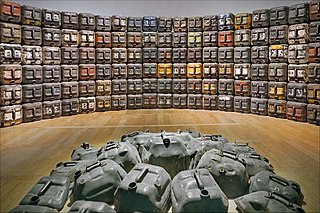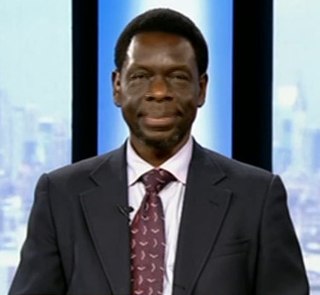White supremacy is the belief that white people are superior to those of other races and thus should dominate them. The belief favors the maintenance and defense of any power and privilege held by white people. White supremacy has roots in the now-discredited doctrine of scientific racism and was a key justification for European colonialism.

Afrocentrism is a worldview that is centered on the history of people of African descent or a view that favors it over non-African civilizations. It is in some respects a response to Eurocentric attitudes about African people and their historical contributions. It seeks to counter what it sees as mistakes and ideas perpetuated by the racist philosophical underpinnings of Western academic disciplines as they developed during and since Europe's Early Renaissance as justifying rationales for the enslavement of other peoples, in order to enable more accurate accounts of not only African but all people's contributions to world history. Afrocentricity deals primarily with self-determination and African agency and is a pan-African point of view for the study of culture, philosophy, and history.

The Anarchist Cookbook, first published in January 1971, is a book containing instructions for the manufacture of explosives, rudimentary telecommunications phreaking devices, and related weapons, as well as instructions for the home manufacture of illicit drugs, including LSD. It was written by William Powell at the apex of the counterculture era to protest against United States's involvement in the Vietnam War. Powell converted to Anglicanism in 1976 and later attempted to have the book removed from circulation. However, the copyright belonged to the publisher, who continued circulation until the company was acquired in 1991. Its legality has been questioned in several jurisdictions.
White guilt is a belief that white people bear a collective responsibility for the harm which has resulted from historical or current racist treatment of people belonging to other ethnic groups, as for example in the context of the Atlantic slave trade, European colonialism, and the genocide of indigenous peoples.

Dehumanization is the denial of full humanity in others along with the cruelty and suffering that accompany it. A practical definition refers to it as the viewing and the treatment of other people as though they lack the mental capacities that are commonly attributed to human beings. In this definition, every act or thought that regards a person as "less than" human is dehumanization.
Racism in Russia mainly appears in the form of negative attitudes towards non-ethnic Russian citizens, immigrants or tourists and negative actions against them by some Russians. Traditionally, Russian racism includes antisemitism and Tatarophobia, as well as hostility towards the various peoples of the Caucasus, Central Asia, East Asia and Africa.
Racism has been a recurring part of the history of Europe.

Ukraine is a multi-ethnic country that was formerly part of the Soviet Union. Valeriy Govgalenko argues that racism and ethnic discrimination has arguably been a largely fringe issue in the past, but has had a climb in social influence due to ultra-nationalist parties gaining attention in recent years. There have been recorded incidents of violence where the victim's race is widely thought to have played a role, these incidents receive extensive media coverage and are usually condemned by all mainstream political forces. Human Rights Watch reported that "racism and xenophobia remain entrenched problems in Ukraine". In 2012 the European Commission against Racism and Intolerance (ECRI) reported that "tolerance towards Jews, Russians and Romani appears to have significantly declined in Ukraine since 2000 and prejudices are also reflected in daily life against other groups, who experience problems in accessing goods and services". From 2006 to 2008, 184 attacks and 12 racially motivated murders took place. In 2009, no such murders were recorded, but 40 racial incidents of violence were reported. It is worth considering that, according to Alexander Feldman, president of the Association of National and Cultural Unions of Ukraine, "People attacked on racial grounds do not report the incidents to the police and police often fail to classify such attacks as racially motivated and often write them off as domestic offence or hooliganism".
Racism in South Africa can be traced back to the earliest historical accounts of interactions between African, Asian, and European peoples along the coast of Southern Africa. It has existed throughout several centuries of the history of South Africa, dating back to the Dutch colonization of Southern Africa, which started in 1652. Before universal suffrage was achieved in 1994, White South Africans, especially Afrikaners during the period of Apartheid, enjoyed various legally or socially sanctioned privileges and rights that were denied to the indigenous African peoples. Examples of systematic racism over the course of South Africa's history include forced removals, racial inequality and segregation, uneven resource distribution, and disenfranchisement. Racial controversies and politics remain major phenomena in the country.
Racism on the Internet sometimes also referred to as cyber-racism and more broadly considered as an online hate crime or an internet hate crime consists of racist rhetoric or bullying that is distributed through computer-mediated means and includes some or all of the following characteristics: ideas of racial uniqueness, racist attitudes towards specific social categories, racist stereotypes, hate-speech, nationalism and common destiny, racial supremacy, superiority and separation, conceptions of racial otherness, and anti-establishment world-view. Racism online can have the same effects as offensive remarks made face-to-face.
Discourse on Colonialism is an essay by Aimé Césaire, a poet and politician from Martinique who helped found the négritude movement in Francophone literature. Césaire first published the essay in 1950 in Paris with Éditions Réclame, a small publisher associated with the French Communist Party. Five years later, he then edited and republished it with the anticolonial publisher Présence africaine. The 1955 edition is the one with the widest circulation today and serves as a foundational text of postcolonial literature that discusses what Césaire described as the appalling affair of the European civilizing mission. Rather than elevating the non-Western world, the colonizers de-civilize the colonized.

Decoloniality is a school of thought that aims to delink from Eurocentric knowledge hierarchies and ways of being in the world in order to enable other forms of existence on Earth. It critiques the perceived universality of Western knowledge and the superiority of Western culture, including the systems and institutions that reinforce these perceptions. Decolonial perspectives understand colonialism as the basis for the everyday function of capitalist modernity and imperialism.
Ricardo Duchesne is a Puerto Rican-born Canadian historical sociologist and was until 2019 a professor at the University of New Brunswick's Saint John campus. His main research interests are Western civilization, the rise of the West, and multiculturalism. Duchesne's views on immigration and multiculturalism are racist and white nationalist. He has denied being a racist to the mainstream press, but has described himself as being "the only academic in Canada, and possibly the Western world, who questions the ideology of diversity while advocating white identity politics."

The white genocide, white extinction, or white replacement conspiracy theory is a white nationalist conspiracy theory that claims there is a deliberate plot to cause the extinction of white people through forced assimilation, mass immigration, and/or violent genocide. It purports that this goal is advanced through the promotion of miscegenation, interracial marriage, mass non-white immigration, racial integration, low fertility rates, abortion, pornography, LGBT identities, governmental land-confiscation from whites, organised violence, and eliminationism in majority white countries. Under some theories, Black people, Hispanics, and Muslims are blamed for the secret plot, but usually as more fertile immigrants, invaders, or violent aggressors, rather than as the masterminds. A related, but distinct, conspiracy theory is the Great Replacement theory.
The relationship between race and video games has received substantial academic and journalistic attention. Games offer opportunities for players to explore, practice, and re-enforce cultural and social identities. Because of the multifaceted cultural implications of video games, there may be issues of race involved in the player base, the creative process, or within the game's universe. Video games predominantly created and played by one racial group can unintentionally perpetuate racial stereotypes and limit players' choices to preconceived notions of racial bias, and issues of representation and harassment may arise in the industry and the player community.
Stereotypes about Africa, Africans, and African culture are common, especially in the Western World. European imperialism was often justified on paternalistic grounds, portraying Africa as less civilized, and Africans as less capable of civilizing themselves. As of the 2010s, these stereotypes persisted in European media.
The Great Replacement, also known as replacement theory or great replacement theory, is a white nationalist far-right conspiracy theory espoused by French author Renaud Camus. The original theory states that, with the complicity or cooperation of "replacist" elites, the ethnic French and white European populations at large are being demographically and culturally replaced by non-white peoples—especially from Muslim-majority countries—through mass migration, demographic growth and a drop in the birth rate of white Europeans. Since then, similar claims have been advanced in other national contexts, notably in the United States. Mainstream scholars have dismissed these claims of a conspiracy of "replacist" elites as rooted in a misunderstanding of demographic statistics and premised upon an unscientific, racist worldview. According to the Encyclopædia Britannica, the Great Replacement "has been widely ridiculed for its blatant absurdity."
Black Star News is an African-American news outlet based in New York.

Milton Allimadi is a Ugandan-American author, journalist, professor, and a co-founder of Black Star News.

The Hearts of Darkness: How White Writers Created the Racist Image of Africa is a 2003 non-fiction book by Milton Allimadi.








